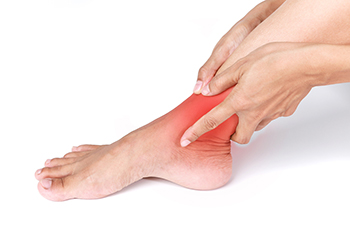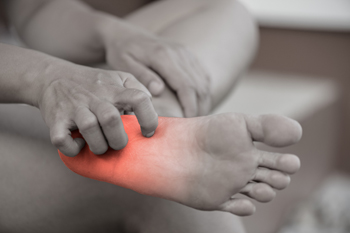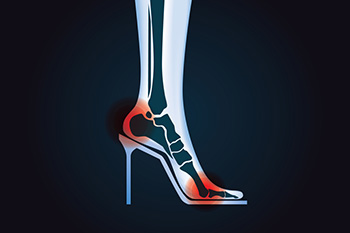Blog
Ankle Arthritis

While the ankle joint is less likely to be affected by arthritis than other joints, when it is, it means that the tibiotalar joint – the joint between the shin bone and ankle bone – is worn out. The most common cause of this condition is a previous injury, such as an ankle fracture. In such cases, something called osteonecrosis can result from ankle injuries, where there is damage to the blood flow to a portion of the bone that can then lead to ankle arthritis. Other causes of ankle arthritis are rheumatoid arthritis (which can cause joint inflammation and damage to the cartilage), infections of a joint leading to damage of cartilage cells, being overweight, placing a larger burden of weight on the ankle joint, and possibly genetic factors. The most common symptom of ankle arthritis is joint pain. Other indicators of this condition include stiffness in the ankle, swelling in the joint, bone spurs on the joint, deformity of the joint, and a feeling of instability in the joint. One is less apt to feel tingling and numbness in the feet and toes from ankle arthritis due to irritation of the nerves, but it can happen. Changes in footwear, adding cushioned inserts in shoes, using a brace to help hold the ankle in position, and modification of activity can relieve discomfort associated with ankle arthritis. Sometimes, however, surgery is necessary. If your ankle hurts and you feel you might have ankle arthritis, it is suggested that you see a podiatrist for proper diagnosis and customized treatment.
Arthritis can be a difficult condition to live with. If you are seeking treatment, contact one of our podiatrists from Pennsylvania. Our doctors can provide the care you need to keep you pain-free and on your feet.
Arthritic Foot Care
Arthritis is a term that is commonly used to describe joint pain. The condition itself can occur to anyone of any age, race, or gender, and there are over 100 types of it. Nevertheless, arthritis is more commonly found in women compared to men, and it is also more prevalent in those who are overweight. The causes of arthritis vary depending on which type of arthritis you have. Osteoarthritis for example, is often caused by injury, while rheumatoid arthritis is caused by a misdirected immune system.
Symptoms
- Swelling
- Pain
- Stiffness
- Decreased Range of Motion
Arthritic symptoms range in severity, and they may come and go. Some symptoms stay the same for several years but could potentially get worse with time. Severe cases of arthritis can prevent its sufferers from performing daily activities and make walking difficult.
Risk Factors
- Occupation – Occupations requiring repetitive knee movements have been linked to osteoarthritis
- Obesity – Excess weight can contribute to osteoarthritis development
- Infection – Microbial agents can infect the joints and trigger arthritis
- Joint Injuries – Damage to joints may lead to osteoarthritis
- Age – Risk increases with age
- Gender –Most types are more common in women
- Genetics – Arthritis can be hereditary
If you suspect your arthritis is affecting your feet, it is crucial that you see a podiatrist immediately. Your doctor will be able to address your specific case and help you decide which treatment method is best for you.
If you have any questions, please feel free to contact one of our offices located in Plymouth Meeting and Ambler, PA . We offer the newest diagnostic and treatment technologies for all your foot care needs.
How Peripheral Neuropathy Affects Elderly People

Peripheral neuropathy, or neuropathy, is a term for nerve damage to the peripheral nervous system. These are nerves that are outside of the brain and spinal cord. Peripheral neuropathy can create various symptoms which may impair a person’s balance and their perception of their body and its movement. These symptoms include numbness, pain, and weakness in the feet. Older adults are more prone to developing peripheral neuropathy as a complication of diabetes, which can cause them to have foot drop, difficulty walking up stairs, rising out of their chairs, and standing up from a crouching position. All of this can increase the elderly person’s already heightened risk of falls. If you or someone you love is experiencing any of the symptoms mentioned here, it is suggested that you make an appointment with a podiatrist for a full examination and evaluation.
Neuropathy
Neuropathy can be a potentially serious condition, especially if it is left undiagnosed. If you have any concerns that you may be experiencing nerve loss in your feet, consult with one of our podiatrists from Pennsylvania. Our doctors will assess your condition and provide you with quality foot and ankle treatment for neuropathy.
What Is Neuropathy?
Neuropathy is a condition that leads to damage to the nerves in the body. Peripheral neuropathy, or neuropathy that affects your peripheral nervous system, usually occurs in the feet. Neuropathy can be triggered by a number of different causes. Such causes include diabetes, infections, cancers, disorders, and toxic substances.
Symptoms of Neuropathy Include:
- Numbness
- Sensation loss
- Prickling and tingling sensations
- Throbbing, freezing, burning pains
- Muscle weakness
Those with diabetes are at serious risk due to being unable to feel an ulcer on their feet. Diabetics usually also suffer from poor blood circulation. This can lead to the wound not healing, infections occurring, and the limb may have to be amputated.
Treatment
To treat neuropathy in the foot, podiatrists will first diagnose the cause of the neuropathy. Figuring out the underlying cause of the neuropathy will allow the podiatrist to prescribe the best treatment, whether it be caused by diabetes, toxic substance exposure, infection, etc. If the nerve has not died, then it’s possible that sensation may be able to return to the foot.
Pain medication may be issued for pain. Electrical nerve stimulation can be used to stimulate nerves. If the neuropathy is caused from pressure on the nerves, then surgery may be necessary.
If you have any questions, please feel free to contact one of our offices located in Plymouth Meeting and Ambler, PA . We offer the newest diagnostic and treatment technologies for all your foot care needs.
Effective Foot Care Methods for High Heel Wearers

Many foot problems can occur when high heels are frequently worn. It is important to protect the feet, and there are specific methods that can be implemented, which may make the feet feel better. When the day is over, and the high heels come off, many women walk barefoot to stretch their foot muscles out. Excess friction from wearing high heels may cause a blister to form, and it is beneficial to cover it with a protective bandage. Popping the blister may prolong the healing, and covering it can be helpful in resisting the urge to pop it. When the feet are soaked in a tub of warm water, it soothes the muscles, and this can be followed by applying a good moisturizer. Foot yoga can be beneficial to practice as often as possible, and many women find this to be effective in strengthening the entire foot. Pampering the feet always feels good, and getting a pedicure is helpful in maintaining proper skin conditions. There are different types of high heels the feet can feel comfortable in, and it is suggested that you consult with a podiatrist who can provide you with beneficial information about what type of high heels to wear.
High heels have a history of causing foot and ankle problems. If you have any concerns about your feet or ankles, contact one of our podiatrists from Pennsylvania. Our doctors can provide the care you need to keep you pain-free and on your feet.
Effects of High Heels on the Feet
High heels are popular shoes among women because of their many styles and societal appeal. Despite this, high heels can still cause many health problems if worn too frequently.
Which Parts of My Body Will Be Affected by High Heels?
- Ankle Joints
- Achilles Tendon – May shorten and stiffen with prolonged wear
- Balls of the Feet
- Knees – Heels cause the knees to bend constantly, creating stress on them
- Back – They decrease the spine’s ability to absorb shock, which may lead to back pain. The vertebrae of the lower back may compress.
What Kinds of Foot Problems Can Develop from Wearing High Heels?
- Corns
- Calluses
- Hammertoe
- Bunions
- Morton’s Neuroma
- Plantar Fasciitis
How Can I Still Wear High Heels and Maintain Foot Health?
If you want to wear high heeled shoes, make sure that you are not wearing them every day, as this will help prevent long term physical problems. Try wearing thicker heels as opposed to stilettos to distribute weight more evenly across the feet. Always make sure you are wearing the proper shoes for the right occasion, such as sneakers for exercising. If you walk to work, try carrying your heels with you and changing into them once you arrive at work. Adding inserts to your heels can help cushion your feet and absorb shock. Full foot inserts or metatarsal pads are available.
If you have any questions please feel free to contact one of our offices located in Plymouth Meeting and Ambler, PA . We offer the newest diagnostic and treatment technologies for all your foot and ankle needs.

